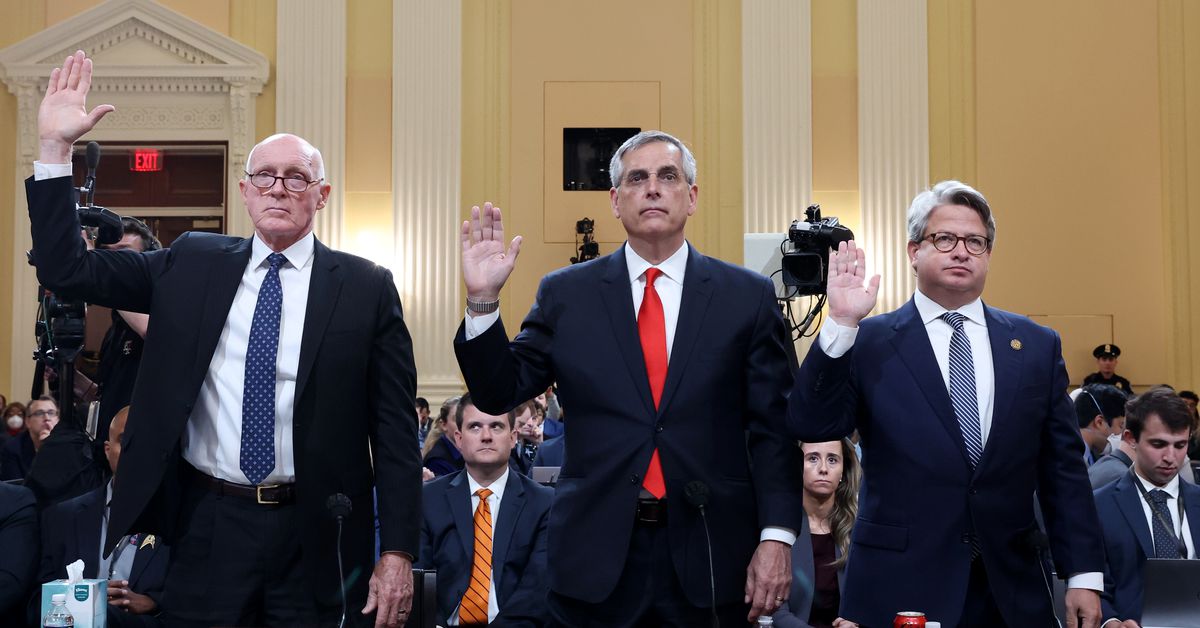In its fourth hearing on Tuesday, the select House committee investigating the January 6 attacks focused on Trump’s efforts to overturn the 2020 el
In its fourth hearing on Tuesday, the select House committee investigating the January 6 attacks focused on Trump’s efforts to overturn the 2020 election results in states, particularly in Georgia and Arizona, and by working to shore up its last-ditch strategy to undermine the counting of electoral votes on January 6 by offering up alternate slates of electors.
The hearing provided new details about the scope of the latter plot in particular, which also included efforts to pressure Vice President Mike Pence and was knowingly based on falsehoods. Below are some takeaways from the hearing thus far.
1) Ron Johnson’s slate of electors
The lobbying effort by Trump allies in Congress to keep him power continued right until the joint session at the Capitol started on January 6, 2021. Rusty Bowers, the Republican speaker of the Arizona House and the first witness to testify Tuesday, said that Rep. Andy Biggs (R-AZ) lobbied him that morning to support decertifying the state’s electors that would be counted that day.
The #Jan6thCommittee presented a Jan. 6, 2021 text exchange between a Sen. Ron Johnson aide and a Pence aide regarding a list of pro-Trump electors that Johnson purportedly wanted to hand deliver to the VP. pic.twitter.com/qIY2adlYwR
— Tim Hanrahan (@TimJHanrahan) June 21, 2022
The committee delved into just how much coordination the Trump campaign had done, in multiple states and in conjunction with party and state officials and members of Congress ahead of January 6 on its “alternate slates of electors” scheme.
Those involved arranged for fake electors in states they wanted to contest to serve as substitutes for the legitimate representatives to the Electoral College, who had already cast their votes for Biden. The idea was that, when Pence gave the word, somehow these prepared slates of fake electors would replace these legitimate electoral votes with ad hoc groups of Trump supporters who had falsely labeled themselves as electors for several swing states.
In perhaps the biggest revelation of the day, the committee published text messages between aides to Pence and Sen. Ron Johnson (R-WI) in which a Johnson staffer asked if his boss could give the vice president the paperwork from two slates of fake electors on the Senate floor. The Pence aide responded succinctly “do not give them to him.”
Although the committee had previously revealed that at least one member of Congress, Rep Scott Perry (R-PA) had sought a pardon from Trump for his efforts to overturn the election, it provides new details on just how Republican elected officials were actively abetting Trump’s efforts.
2) Giuliani admitted there was no evidence of fraud
Trump and his top attorneys, Rudy Giuliani, Jenna Ellis, and John Eastman, were repeatedly in touch with Bowers and pushing him to take various steps to nullify Biden’s win in Arizona and declare Trump the winner instead.
Bowers testified that despite his constant requests for evidence of voter fraud from the Trump campaign, they never provided any such evidence. As the state house speaker, Trump’s team viewed Bowers’s support was necessary to overturn the election there because any effort to substitute the state’s legitimate electors would require a vote by the state legislature.
This culminated when Trump attorney Rudy Giuliani conceded to Bowers, “We’ve got lots of theories. We just don’t have any evidence.”
3) The toll of going against Trump
Bowers offered up emotional testimony Tuesday, particularly when it came to the reasons he refused to accede to repeated entreaties from Trump and his attorneys to assist in their efforts to overturn the election. Bowers, a Mormon, cited his faith several times as a reason he refused to going along with Trump’s plot.
“It is a tenet of my faith that the Constitution divinely inspired, one of my most basic foundational beliefs.” He added that taking actions contrary to the Constitution is “foreign to my very being.”
Bowers said that he has been subject to an ongoing campaign of harassment as a result of his refusal to go along. He testified that there are weekly protests at his house that include video trucks driving by that label him “a pedophile, a pervert [and] a corrupt politician.”
Bowers was one of three Republican officials to testify before the committee in the first panel of witnesses along with Brad Raffensperger, the Georgia secretary of state and his top aide, Gabriel Sterling. The only witness in the second panel was Shaye Moss, a Georgia election worker who faced a barrage of threats due to a Trump-promoted conspiracy theory about ballot counting in the state.
